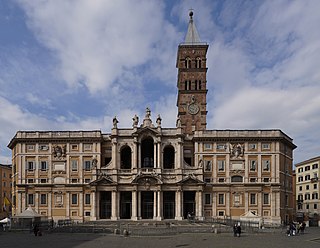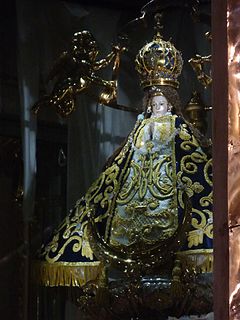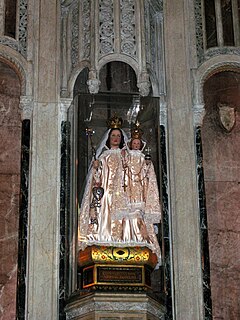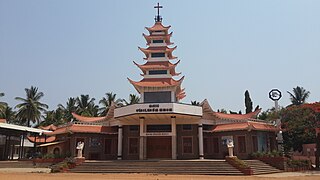
A shrine to the Virgin Mary is a shrine marking an apparition or other miracle ascribed to the Blessed Virgin Mary, or a site on which is centered a historically strong Marian devotion. Such locales are often the destination of pilgrimages.

Bandra ([bæːɳɖɾa]) also known as Vandre ([ʋaːn̪d̪ɾe]) is an upscale coastal suburb located in Mumbai (Bombay) area of the Konkan division, Maharashtra, India. The suburb is located to the immediate north of River Mithi, which separates Bandra from Mumbai City district. It is the third-largest commercial hub in Maharashtra, after Bombay city district& Poona (Pune), primarily aided by the Bandra-Kurla Complex.

Officially the Basilica of Our Lady of the Mount Bandra, colloquially known as Mount Bandra and Mount St Mary Church, is a basilica of the Catholic Church in India located at Bandra in Bombay (Mumbai).

The Nativity of the Blessed Virgin Mary, the Nativity of Mary, the Marymas or the Birth of the Virgin Mary, refers to a Christian feast day celebrating the birth of Mary, mother of Jesus.

The Bandstand Promenade, also known as Bandra Bandstand is a 1.2 kilometer long walkway along the sea on the western coast of Mumbai, India in the neighborhood of Bandra. It is simultaneously a popular hangout spot, a jogging track and a park.

Our Lady of Walsingham is a title of Mary, mother of Jesus venerated by Catholics, Western Rite Orthodox Christians, and some Anglicans associated with the Marian apparitions to Richeldis de Faverches, a pious English noblewoman, in 1061 in the village of Walsingham in Norfolk, England. Lady Richeldis had a structure built named "The Holy House" in Walsingham which later became a shrine and place of pilgrimage.

Our Lady of Good Health, also known as Our Lady of Vailankanni, is a title given to the Blessed Virgin Mary by devotees. She is said to have appeared twice in the town of Velankanni, Tamil Nadu, India, in the 16th to 17th centuries.

Our Lady of San Juan de los Lagos is a Roman Catholic title of the Blessed Virgin Mary venerated by Mexican and Texan faithful. The original image is a popular focus for pilgrims and is located in the state of Jalisco, in central Mexico, 122 kilometers (76 mi) northeast of the city of Guadalajara. The statue is venerated both in Mexico and in the United States where it is known by its proxy title Nuestra Señora de San Juan del Valle, mainly focused in Texas.

The Basilica and National Shrine of Our Lady of Consolation is a minor basilica of the Roman Catholic Church and a shrine to the Virgin Mary, operated by the Conventual Franciscan Friars. It is located in Carey, a village in Northwest Ohio. It was made a national shrine by the U.S. Conference of Catholic Bishops.

The Basilica of Our Lady of Good Health, also known as Sanctuary of Our Lady of Velankanni, is a Marian shrine located at the town of Velankanni in Tamil Nadu, India. The place is also a minor basilica of the Latin Catholic Church dedicated to Our Lady of Good Health. Devotion to Our Lady of Good Health of Velankanni can be traced back to the mid-16th century, attributed to three separate miracles believed by devotees to have been worked at the site: the apparition of Blessed Mary and the Christ Child to a slumbering shepherd boy, the healing of a handicapped buttermilk vendor, and the rescue of Portuguese sailors from a deadly sea storm.

Our Lady of Manaoag is a Roman Catholic title of the Blessed Virgin Mary venerated in Manaoag, Pangasinan, the Philippines.
Haregaon is a village in Shrirampur, Ahmednagar District, Maharashtra, India. It is approximately 5 km from Shrirampur city on altitude.

The Basilica of Our Lady of Walsingham, informally known as the Slipper Chapel or the Chapel of Saint Catherine of Alexandria, is a Catholic basilica in Houghton Saint Giles, Norfolk, England. Built in 1340, it was the last chapel on the pilgrim route to Walsingham.

Dream Out Loud (DOL) is an Indian indie rock band, formed by Suraj Jagan and Chandresh Kudwa. They had a three-minute cameo appearance in the Bollywood movie Rock On.

St Michael's Church is one of the oldest Christian (Catholic) churches in the Mahim suburb of Mumbai (Bombay), situated at the junction of LJ Road and Mahim Causeway. Initially known as San Miguel in Portuguese, the original structure was built by Franciscan missionaries of the Indo-Portuguese era, some time around 1534 AD, in what was then Portuguese Bombay. It was rebuilt a number of times; the present structure dates to 1973. From 1739 to 1761, St Michael's also served as a refuge to the popular icon of the Virgin Mary; the icon is now placed at the present-day Basilica of Our Lady of the Mount of Bandra.

St. Lawrence Shrine Basilica or Attur Basilica is a Roman Catholic church in Karkala, India. It was built in 1759 and is purported to be the site of many miracles. It is by characterized its Attur Jatre or Attur Festival.

The Minor Basilica of Our Lady of the Rosary of Manaoag, located on top of a hill in the town, has been canonically affiliated with the Papal Basilica of Saint Mary Major in Rome since June 2011. The parish encompassing Manaoag and the surrounding towns is administered by the Order of Preachers under the Roman Catholic Archdiocese of Lingayen-Dagupan. It was officially declared a Basilica in 2015.

The Basilica of Our Lady of Health located in Harihar in India is a pilgrimage centre dedicated to Our Lady of Health.

In the Indian subcontinent, mannat is a wish that one desires to come to fruition, and it may also refer to the vow one makes and fulfils to one or more gods, or a saint after the wish comes true.




















